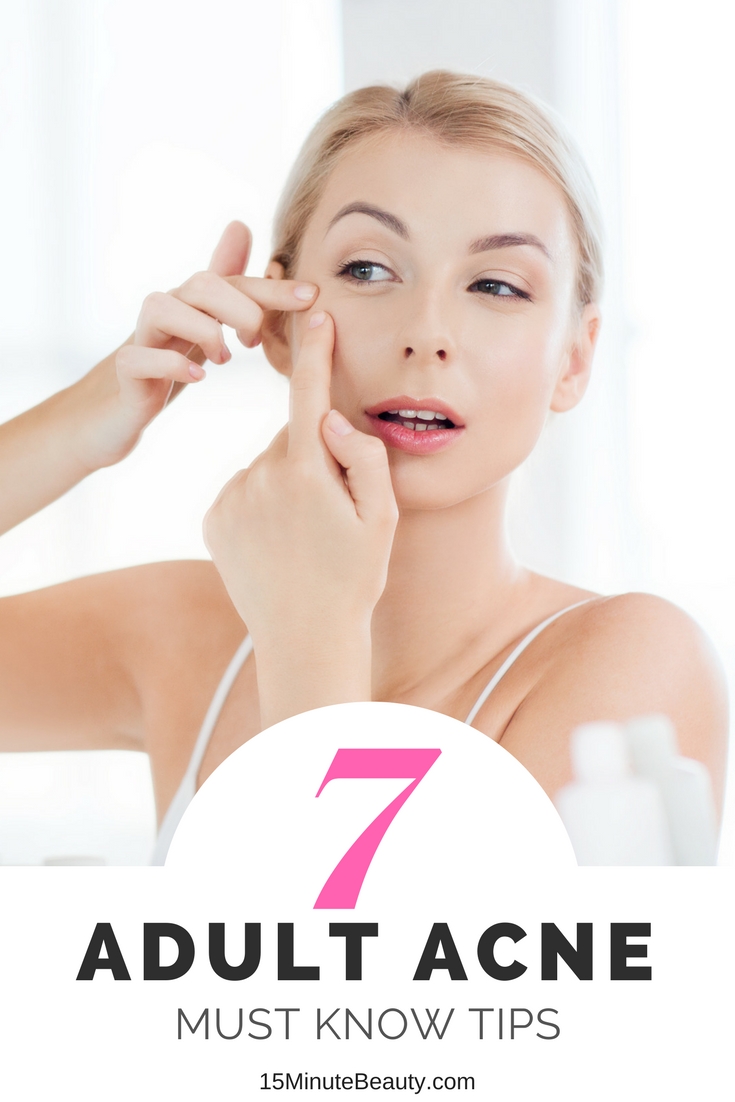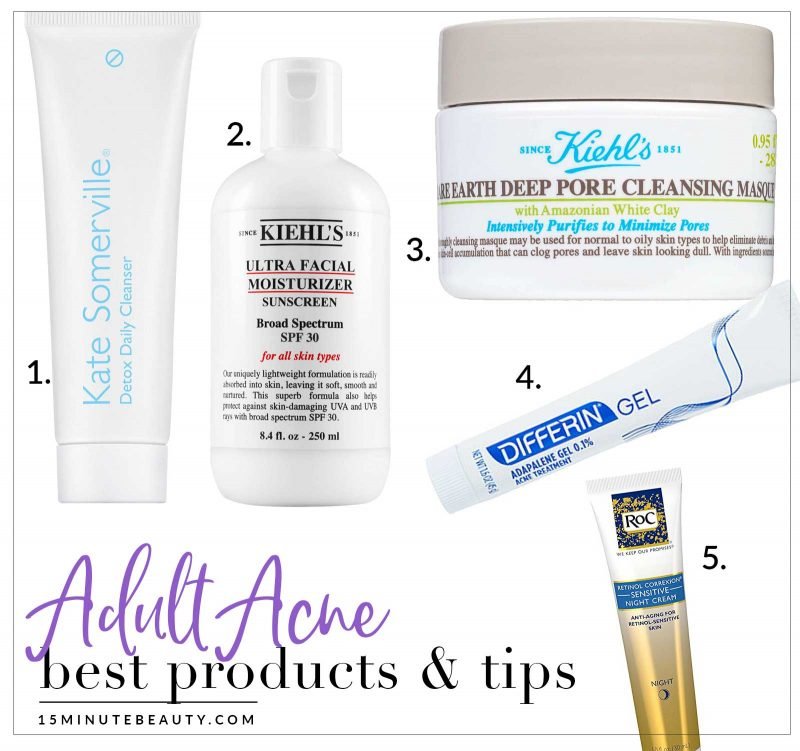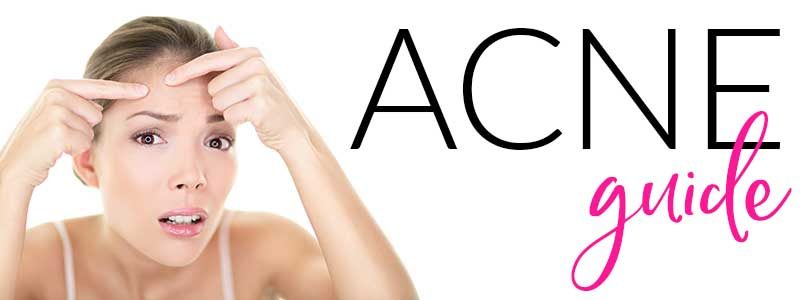
I had acne as a teenager, and I can definitely say that it had a huge effect on my self esteem. My skin finally cleared up quite a bit when I hit my 20s, but I’m still dealing with adult acne now in my early 40s! The approach to acne as an adult is a little bit different than in your teen years. You can learn more about blemishes in my Acne Guide post, where I go over how those pimples form and how different active ingredients interrupt that process to help your skin clear up!
As a teenager, I could treat my acne with benzoyl peroxide, salicylic acid, you name it! All of the active ingredients were my friend (I thought), and while I had some success, overall I didn’t really have clear skin until my early 20’s when my hormones stopped freaking out, and I was no longer beating it up with so many ingredients. While I still experience the occasional blemish now that I’m in my (late) 30’s, I’ve realized that treating adult acne is a whole different ball game than the blemishes of my teen years. And I’ve also realized that my teenage game plan of using every product possible was overkill and probably made things worse.

1. Simplify Your Skincare Routine and Be Gentle
As a teen, I used pretty much every acne treatment that I could. Even if I had 1 problem spot, I would apply my spot treatment to my entire face. I used the products in large amounts, multiple times a day. More is more, right? Not exactly.
It turns out that more products, especially when it comes to acne treatment, often results in dryness and irritation. That in turn can actually give you even more blemishes! Start with gentle products and add in active ingredients that won’t irritate your skin.
Try:
Kate Somerville Detox Daily Cleanser: This is my favorite gentle face wash for acne, it has salicylic acid. See my full Detox Daily Cleanser review here.
Neutrogena Oil-Free Acne Wash: Another gentle Salicylic Acid face wash, but at a lower price point.
2. Add Moisture
If you have acne, then chances are you also have oily skin. And if your skin is oily, then you don’t need moisturizer, right? That’s just one more thing to clog up your skin.
Actually, no. Oil is not hydration, and avoiding moisturizer because your skin is oily is a mistake. Even just a simple lightweight lotion can add enough hydration to your skin to cut down on oil production, your skin is no longer working so hard to hold on to moisture. Less oil production in turn results in fewer clogged pores and fewer blemishes.
Try:
Kiehl’s Ultra Facial Moisturizer Broad Spectrum SPF 30: This has long been my favorite basic morning lightweight moisturizer with sunscreen.
Cerave AM Face Moisturizer with Sunscreen, SPF 30: This Cerave is very close to my beloved Kiehl’s, but at a lower price point.
3. Keep Your Pores Cleared Out
As a teen, I loved to use masks on my skin. Clay masks, hydrating masks, and especially peel off masks were great to put on while doing my homework at night.
As an adult it is hard to find the time for intensive treatments like masks or a peel, but the time is definitely well spent! As an adult, I’ve discovered that keep my pores cleaned out regularly makes a really big difference in how my skin looks!
I love to use a clay mask to draw out impurities in your pores. In the past I used the Mint Julep mask, but as I’ve gotten older and have developed rosacea this mask is a bit aggressive for my skin, resulting in irritation. I use the Kiehl’s Rare Earth Mask instead, a gentler clay mask that clears out my pores without causing irritation.
Try:
Queen Helene Masque Mint Julep
Kiehl’s Rare Earth Deep Pore Cleansing Masque, my review here
4. Add a Retinoid
Everyone knows about benzoyl peroxide and salicylic acid, but there are other ingredients out there to fight acne, and one of them is the gold standard of anti-aging.
Retinoids are the gold standard of topical treatment for aging, but when it comes to acne they really work! Retinoids will improve skin’s texture, smoothing roughness, dyspigmentation and fine wrinkles. When it comes to acne, Retinoids will help to clean out your pores, increase cell turnover and help even out any hyperpigmentation after blemishes. When taken by mouth they have even more dramatic effects on your skin and acne.
Note that retinoids are not considered pregnancy safe, so you should avoid them if you are pregnant or trying to become pregnant. You can learn more about in my pregnancy skincare guide.
Try:
Differin Acne Treatment: This was previously available only via prescription
Roc Retinol Correxion Anti-Aging Sensitive Skin Night Cream
5. Give Products a Chance to Work
All too often, we try out new products and if we don’t see the results we hope for immediately, we stop and move on to another product. When it comes to skin care, you should wait at least 6-8 weeks before changing things around. It takes your skin time to see the benefits of the new products.
Along the same lines, you need to use your products every day. It’s easy to get lazy and skip a few steps here and there… before you know it you’re only washing your face a few times a week and you haven’t used your treatments in a week! Rather than just trying to blast away blemishes with products when they pop up, if you use your treatment products consistently every day you’ll actually prevent those blemishes from every occurring. Which sounds even better.
6. Keep Track to Identify Causes of Flares
It sounds silly, but you should start keeping track of how your skin is reacting and how your acne is doing. Keep track of known causes such as sleep, stress, your diet, changes in skincare and your menstrual cycle. Keeping a diary last year helped me identify that one particular anti-aging serum was doing wonders for my skin most of the time, but when using this serum the week before my period the result was painful cystic blemishes. I switched to another product and the cystic pimples have completely disappeared.
7. Get Professional Help!
While a great skin care routine can dramatically help many skin care issues, there are some cases that need a little more help. If you have had a renewed increased in acne in your mid to late 30s you should see a physician to rule out Rosacea. Adult acne can include deep, cystic blemishes and these are more likely to result in scarring. To prevent scarring, I recommend seeing a dermatologist as well.


 I’m a doctor, a mommy and a bit of a beauty addict. If you let me, I can take 2 hours to get ready in the morning. Really. I'm on a quest for faster beauty that works!
I’m a doctor, a mommy and a bit of a beauty addict. If you let me, I can take 2 hours to get ready in the morning. Really. I'm on a quest for faster beauty that works!